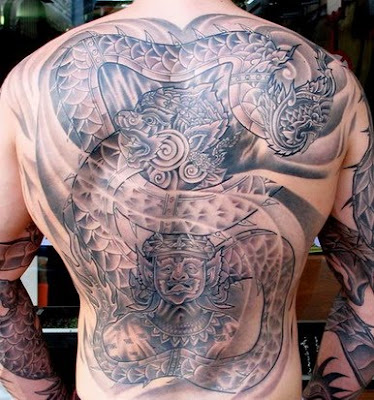 Japanese tattoos form part of asian culture, have been around for a long time and are generally large. The complicated tattoo designs usually dominate most of the body and are so detailed they are also very time consuming as well as expensive. A tradtional body suit, including covering the arms and legs, can take years to complete.
Japanese tattoos form part of asian culture, have been around for a long time and are generally large. The complicated tattoo designs usually dominate most of the body and are so detailed they are also very time consuming as well as expensive. A tradtional body suit, including covering the arms and legs, can take years to complete.Tattooing for spiritual purposes dates back to approximately 10000BC, and around 300BC - 300AD, Japanese design were shought to have spiritual significance as well as functioning as a status symbol
In the Kofun period, around 300 - 600AD, tattoos began having negative connotations also. Instead of being used for ritual purposes, tattoo markings were placed on criminals as a punishment.
At the beginning of the Meiji period the Japanese government, wanting to protect its image and make a good impression on the West, outlawed tattoos, and irezumi took on connotations of criminality. Nevertheless, fascinated foreigners went to Japan seeking the skills of tattoo artists, and traditional tattooing continued underground.
Around 1945, tattoos were legalized again but the criminal image was retained. Japan’s notorious mafia, Yakuza, were often associated with having tattoos to show their connections to the criminal underworld. As a result, many businesses in Japan have banned tattoos, such as public baths and massage parlours.
 Katakana is generally used for foreign names, places, and the words of foreign origin. Therefore if you are from a country that doesn’t use kanji (Chinese characters), your name is normally written in katakana. For Japanese tattoo lettering, people often use Kanji.
Katakana is generally used for foreign names, places, and the words of foreign origin. Therefore if you are from a country that doesn’t use kanji (Chinese characters), your name is normally written in katakana. For Japanese tattoo lettering, people often use Kanji.